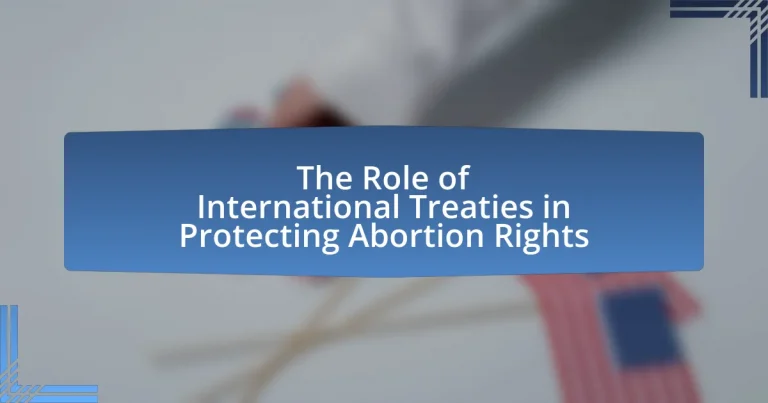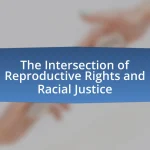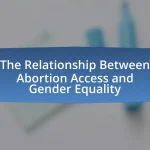International treaties, particularly the Convention on the Elimination of All Forms of Discrimination Against Women (CEDAW) and the International Covenant on Civil and Political Rights (ICCPR), play a vital role in protecting abortion rights by establishing legal frameworks that promote reproductive health and gender equality. These treaties obligate signatory states to ensure women’s access to safe and legal abortion services, influencing national laws and encouraging reforms that enhance reproductive rights. The article examines the impact of these treaties on gender equality, the challenges they face in implementation, and the strategies for strengthening their effectiveness in safeguarding abortion rights globally. Additionally, it highlights the importance of public awareness and advocacy in supporting treaty compliance and improving women’s health outcomes.
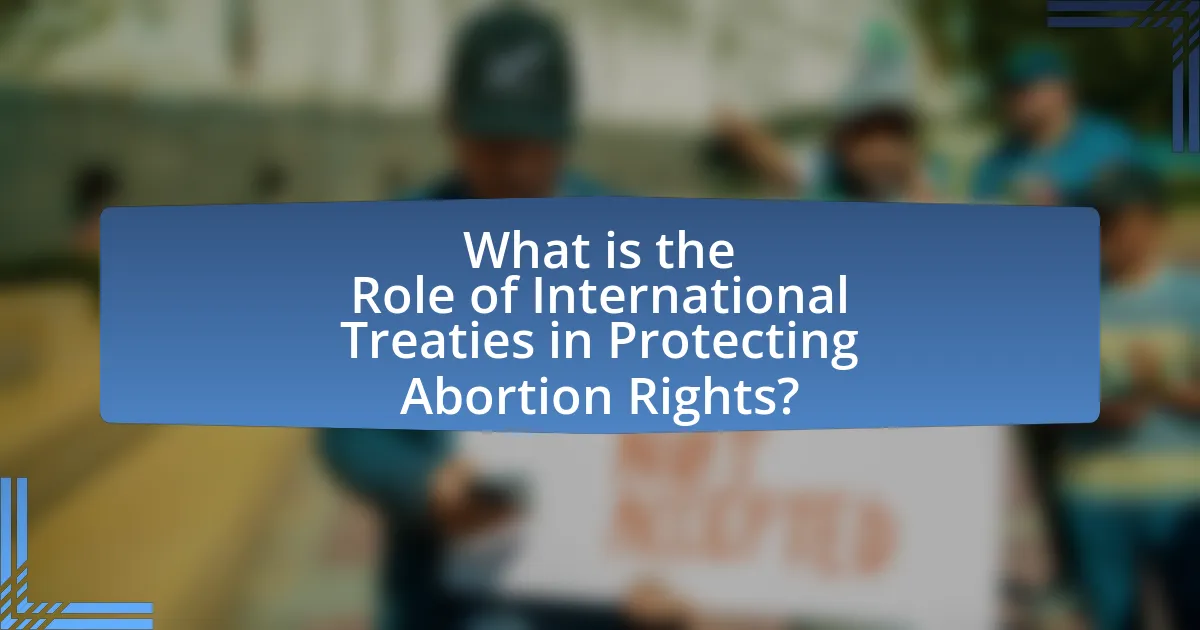
What is the Role of International Treaties in Protecting Abortion Rights?
International treaties play a crucial role in protecting abortion rights by establishing legal frameworks that promote reproductive health and gender equality. These treaties, such as the Convention on the Elimination of All Forms of Discrimination Against Women (CEDAW), obligate signatory states to ensure women’s access to safe and legal abortion services. For instance, CEDAW’s General Recommendation No. 24 emphasizes that discrimination against women includes the denial of access to reproductive health services, including abortion. Additionally, the International Covenant on Civil and Political Rights (ICCPR) recognizes the right to privacy and bodily autonomy, which can be interpreted to support women’s rights to make decisions regarding abortion. These international legal instruments provide a basis for advocacy and legal challenges at national levels, reinforcing the protection of abortion rights globally.
How do international treaties influence national abortion laws?
International treaties influence national abortion laws by establishing legal frameworks and standards that countries are encouraged to adopt. For instance, treaties such as the Convention on the Elimination of All Forms of Discrimination Against Women (CEDAW) obligate signatory states to ensure women’s rights, including reproductive rights, which can lead to the reform of restrictive abortion laws. Additionally, the International Covenant on Civil and Political Rights (ICCPR) has been interpreted to protect the right to privacy and bodily autonomy, further impacting national legislation on abortion. Countries that ratify these treaties often face pressure from international bodies and civil society to align their laws with treaty obligations, resulting in legal changes that enhance access to abortion services.
What are the key international treaties related to abortion rights?
The key international treaties related to abortion rights include the Convention on the Elimination of All Forms of Discrimination Against Women (CEDAW), the International Covenant on Civil and Political Rights (ICCPR), and the International Covenant on Economic, Social and Cultural Rights (ICESCR). CEDAW, adopted in 1979, explicitly addresses women’s rights and has been interpreted to include reproductive rights, including access to safe abortion. The ICCPR, established in 1966, recognizes the right to privacy and personal autonomy, which can encompass decisions regarding abortion. The ICESCR, also from 1966, emphasizes the right to health, which includes access to safe and legal abortion services. These treaties collectively support the protection and promotion of abortion rights on an international level.
How do these treaties define abortion rights?
International treaties define abortion rights primarily through the recognition of women’s rights to health and autonomy. For instance, the Convention on the Elimination of All Forms of Discrimination Against Women (CEDAW) emphasizes that states must ensure women’s access to healthcare services, including reproductive health, which encompasses abortion. Additionally, the International Covenant on Civil and Political Rights (ICCPR) asserts the right to privacy and personal autonomy, which can be interpreted to include decisions regarding abortion. These treaties collectively obligate signatory states to respect, protect, and fulfill women’s reproductive rights, thereby establishing a framework for legal access to abortion services.
Why are international treaties important for women’s rights?
International treaties are crucial for women’s rights as they establish binding legal frameworks that promote gender equality and protect women’s rights globally. These treaties, such as the Convention on the Elimination of All Forms of Discrimination Against Women (CEDAW), provide a platform for countries to commit to eliminating discrimination and ensuring equal rights in various areas, including health, education, and employment. By ratifying these treaties, nations are held accountable to international standards, which can lead to legislative reforms and improved protections for women’s rights. For instance, CEDAW has been instrumental in influencing national laws and policies that enhance women’s access to reproductive health services, thereby directly impacting abortion rights and overall gender equality.
What impact do international treaties have on gender equality?
International treaties significantly advance gender equality by establishing legal frameworks that promote women’s rights and protect against discrimination. For example, the Convention on the Elimination of All Forms of Discrimination Against Women (CEDAW) obligates signatory countries to eliminate gender-based discrimination and ensure equal rights in various sectors, including health, education, and employment. This treaty has led to legislative reforms in numerous countries, enhancing women’s access to reproductive health services and safeguarding their rights, thereby contributing to improved gender equality outcomes.
How do treaties support reproductive health rights globally?
Treaties support reproductive health rights globally by establishing legal frameworks that obligate countries to uphold and protect these rights. For instance, the Convention on the Elimination of All Forms of Discrimination Against Women (CEDAW) mandates state parties to eliminate discrimination against women in healthcare, including reproductive health services. Additionally, the International Covenant on Economic, Social and Cultural Rights (ICESCR) recognizes the right to the highest attainable standard of health, which encompasses access to reproductive health services. These treaties create accountability mechanisms, enabling individuals and organizations to challenge violations and advocate for reproductive health rights on an international level.
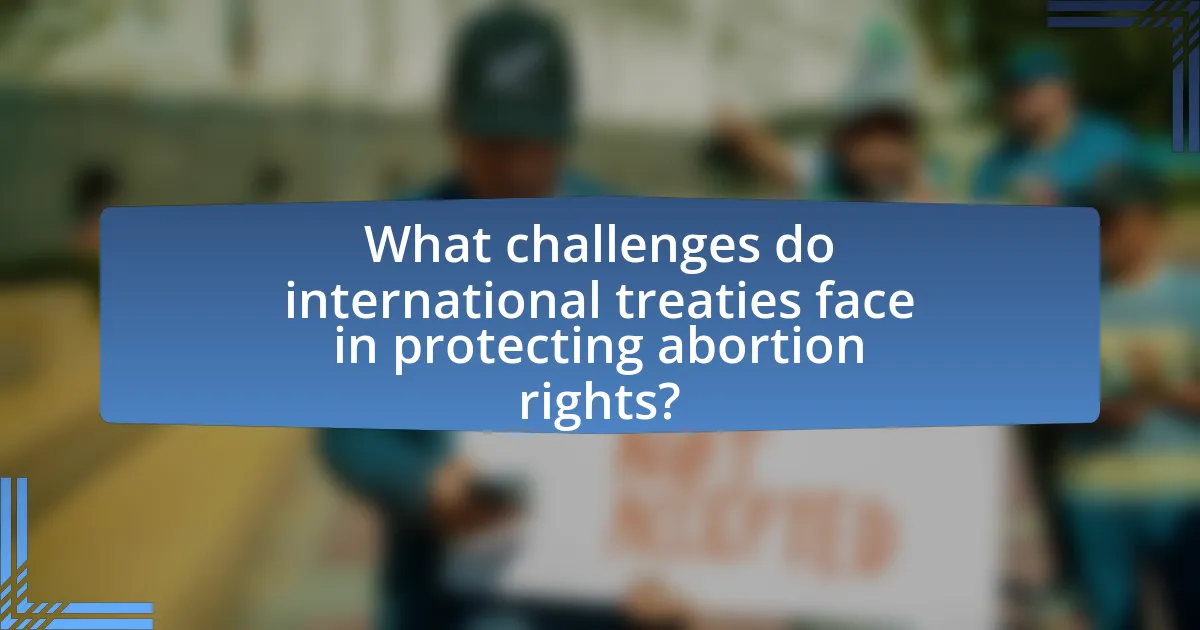
What challenges do international treaties face in protecting abortion rights?
International treaties face significant challenges in protecting abortion rights due to varying national laws, cultural beliefs, and political opposition. Many countries have differing interpretations of human rights, which can lead to inconsistent enforcement of treaty obligations regarding reproductive health. For instance, the Convention on the Elimination of All Forms of Discrimination Against Women (CEDAW) has been ratified by numerous nations, yet some states maintain restrictive abortion laws that contradict the treaty’s principles. Additionally, political shifts can result in the withdrawal from or non-compliance with international agreements, undermining efforts to secure abortion rights globally.
How do cultural and political factors affect treaty implementation?
Cultural and political factors significantly influence treaty implementation by shaping national priorities and public opinion. For instance, in countries where conservative cultural values dominate, treaties promoting abortion rights may face resistance, leading to selective implementation or outright non-compliance. Political leadership also plays a crucial role; governments that prioritize human rights and gender equality are more likely to adhere to international treaties. A relevant example is the 1994 International Conference on Population and Development, where countries with progressive political climates adopted policies supporting reproductive rights, while others resisted due to cultural opposition. Thus, the interplay of cultural beliefs and political will directly impacts how effectively treaties are enacted and enforced.
What role do religious beliefs play in the acceptance of abortion treaties?
Religious beliefs significantly influence the acceptance of abortion treaties by shaping moral perspectives and legislative priorities. For instance, in countries where religious doctrines oppose abortion, such as predominantly Catholic nations, there is often resistance to international treaties that support abortion rights. This resistance is evidenced by the 1994 Cairo Conference on Population and Development, where many religiously influenced states rejected language that would promote abortion access. Additionally, surveys indicate that individuals with strong religious convictions are less likely to support abortion rights, impacting political leaders’ decisions on treaty ratification. Thus, the interplay between religious beliefs and societal values directly affects the acceptance and implementation of abortion treaties globally.
How do political regimes influence adherence to international treaties?
Political regimes significantly influence adherence to international treaties through their governance structures, ideologies, and levels of commitment to international law. Authoritarian regimes often prioritize state sovereignty over international obligations, leading to selective compliance or outright rejection of treaties that conflict with their domestic policies. For example, countries like North Korea have historically disregarded international agreements on human rights, including those related to reproductive rights, due to their political ideologies. Conversely, democratic regimes typically exhibit higher adherence to international treaties, as they are more likely to be held accountable by their citizens and civil society organizations. Research indicates that democracies are more inclined to ratify and implement treaties that protect human rights, including abortion rights, as seen in the commitments made by various European nations to uphold the European Convention on Human Rights. Thus, the nature of a political regime plays a crucial role in determining the extent to which countries comply with international treaties.
What are the consequences of non-compliance with international treaties?
Non-compliance with international treaties can lead to diplomatic tensions, economic sanctions, and legal repercussions for the violating state. When a country fails to adhere to treaty obligations, it risks damaging its international reputation and relationships, as seen in cases like the United States’ withdrawal from the Paris Agreement, which prompted global criticism and strained relations with allies. Additionally, non-compliance may result in legal actions brought before international courts, such as the International Court of Justice, where states can be held accountable for breaches. These consequences underscore the importance of adherence to international treaties in maintaining global order and cooperation.
What legal actions can be taken against countries that violate treaties?
Countries that violate treaties can face several legal actions, including diplomatic negotiations, arbitration, and adjudication in international courts. For instance, the International Court of Justice (ICJ) can adjudicate disputes between states regarding treaty violations, as established in the 1945 United Nations Charter. Additionally, countries may impose sanctions or take collective action through organizations like the United Nations to hold violators accountable. Historical examples include the ICJ ruling in the case of Nicaragua v. United States (1986), where the court found the U.S. violated international law by supporting Contra rebels against Nicaragua, leading to reparations ordered by the court.
How does non-compliance affect women’s health and rights?
Non-compliance with international treaties that protect women’s rights significantly undermines women’s health and rights, particularly in the context of reproductive health. When countries fail to adhere to these treaties, such as the Convention on the Elimination of All Forms of Discrimination Against Women (CEDAW), women often face restricted access to essential health services, including safe abortion and maternal care. For instance, a study by the World Health Organization indicates that restrictive abortion laws lead to higher rates of unsafe abortions, which contribute to maternal mortality and morbidity. Furthermore, non-compliance can perpetuate gender-based violence and discrimination, further compromising women’s overall health and autonomy.
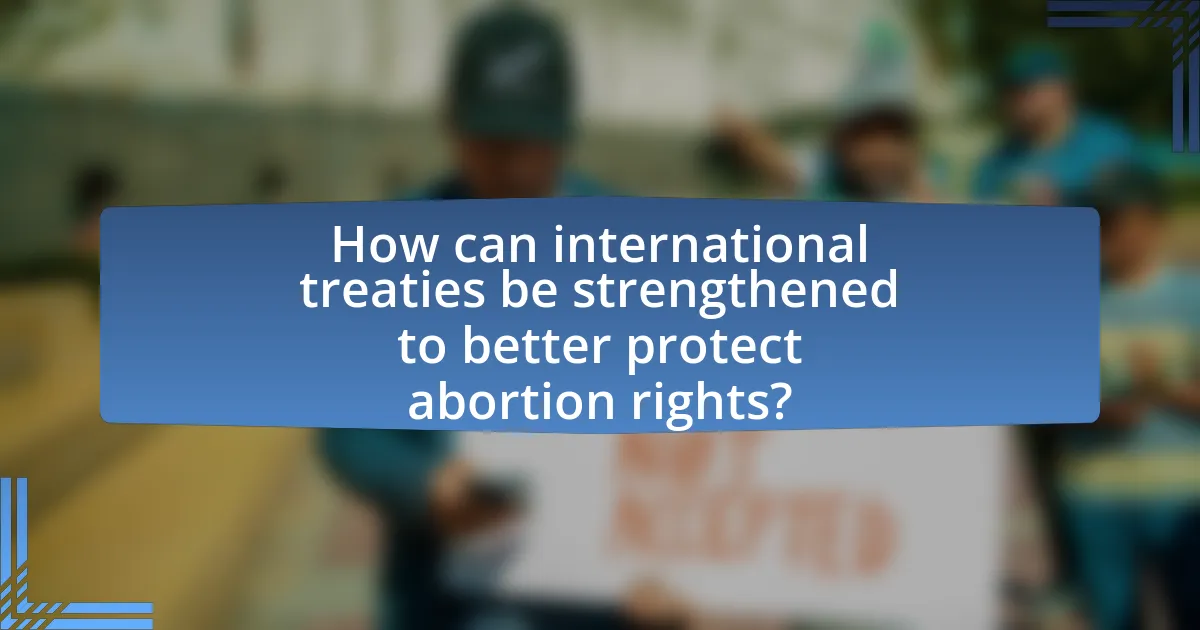
How can international treaties be strengthened to better protect abortion rights?
International treaties can be strengthened to better protect abortion rights by incorporating explicit language that guarantees access to safe and legal abortion services as a fundamental human right. This can be achieved by amending existing treaties, such as the Convention on the Elimination of All Forms of Discrimination Against Women (CEDAW), to include specific provisions that address reproductive rights and access to abortion. Additionally, establishing monitoring mechanisms to ensure compliance with these provisions can enhance accountability among signatory nations. For instance, the World Health Organization reports that restrictive abortion laws contribute to unsafe procedures, highlighting the need for international standards that prioritize women’s health and autonomy.
What strategies can enhance the effectiveness of existing treaties?
Enhancing the effectiveness of existing treaties can be achieved through several strategies, including strengthening enforcement mechanisms, increasing transparency, and fostering inclusive participation. Strengthening enforcement mechanisms ensures that violations are addressed promptly and effectively, as seen in the enforcement of the Convention on the Elimination of All Forms of Discrimination Against Women (CEDAW), which has led to improved compliance among member states. Increasing transparency in treaty processes allows for greater accountability and public scrutiny, which can motivate states to adhere to their commitments. Fostering inclusive participation, particularly by involving civil society organizations and marginalized groups, can ensure that the treaties address the needs of all stakeholders, thereby enhancing their relevance and effectiveness in protecting abortion rights.
How can advocacy groups influence treaty negotiations?
Advocacy groups can influence treaty negotiations by mobilizing public opinion, providing expert testimony, and lobbying decision-makers. These groups often conduct research and disseminate information that highlights the importance of specific issues, such as abortion rights, thereby shaping the narrative around treaty discussions. For instance, organizations like Amnesty International and Human Rights Watch have successfully advocated for the inclusion of reproductive rights in international agreements by presenting data and case studies that demonstrate the impact of restrictive laws on women’s health and autonomy. Their efforts can lead to increased pressure on negotiators to consider these rights as fundamental components of treaties, ultimately affecting the outcomes of negotiations.
What role does public awareness play in treaty effectiveness?
Public awareness significantly enhances treaty effectiveness by fostering informed public discourse and mobilizing support for treaty implementation. When the public is aware of the provisions and implications of treaties, such as those protecting abortion rights, they are more likely to advocate for compliance and accountability from their governments. For instance, the widespread awareness of the Convention on the Elimination of All Forms of Discrimination Against Women (CEDAW) has led to increased advocacy for women’s rights, including reproductive rights, in various countries. This advocacy can pressure governments to adhere to treaty obligations, thereby improving the overall effectiveness of international agreements in protecting abortion rights.
What best practices can be adopted for future treaty development?
Best practices for future treaty development include ensuring inclusive stakeholder engagement, establishing clear and measurable objectives, and incorporating mechanisms for accountability and compliance. Inclusive stakeholder engagement allows diverse perspectives, particularly from marginalized groups, to shape treaty content, enhancing legitimacy and effectiveness. Clear and measurable objectives facilitate assessment of treaty impact, as seen in the Convention on the Elimination of All Forms of Discrimination Against Women, which sets specific goals for member states. Accountability mechanisms, such as regular reporting and independent review processes, ensure adherence to treaty obligations, as demonstrated by the periodic reviews conducted under the International Covenant on Civil and Political Rights. These practices collectively strengthen the framework for treaties aimed at protecting abortion rights and other critical issues.
How can inclusive dialogue improve treaty outcomes?
Inclusive dialogue can improve treaty outcomes by ensuring that diverse perspectives are represented, which leads to more comprehensive and effective agreements. When stakeholders, including marginalized groups, participate in discussions, the resulting treaties are more likely to address the specific needs and rights of all affected parties. For instance, research by the United Nations Development Programme indicates that inclusive processes enhance legitimacy and public support for treaties, ultimately leading to better implementation and adherence. This is particularly relevant in the context of abortion rights, where inclusive dialogue can help to balance differing cultural, ethical, and legal viewpoints, resulting in treaties that are more equitable and widely accepted.
What lessons can be learned from successful treaty implementations?
Successful treaty implementations demonstrate the importance of clear communication and collaboration among stakeholders. Effective treaties often involve extensive negotiation processes that ensure all parties understand their obligations and rights, which fosters trust and compliance. For instance, the Convention on the Elimination of All Forms of Discrimination Against Women (CEDAW) has shown that inclusive dialogue leads to better adherence to treaty provisions, as countries are more likely to implement changes when they feel their perspectives are valued. Additionally, successful treaties often include mechanisms for monitoring and accountability, as seen in the Paris Agreement on climate change, which encourages countries to report on their progress, thereby enhancing commitment to treaty goals. These examples illustrate that clarity, inclusivity, and accountability are critical lessons learned from successful treaty implementations.
What practical steps can individuals take to support abortion rights through international treaties?
Individuals can support abortion rights through international treaties by advocating for the ratification and implementation of treaties that protect reproductive rights, such as the Convention on the Elimination of All Forms of Discrimination Against Women (CEDAW). Engaging in grassroots campaigns to raise awareness about the importance of these treaties can mobilize public support and pressure governments to comply with international standards. Additionally, individuals can participate in lobbying efforts directed at policymakers to ensure that abortion rights are included in national legislation aligned with international commitments. Research shows that countries that ratify CEDAW often see improvements in women’s health outcomes, including access to safe abortion services, highlighting the effectiveness of international treaties in promoting reproductive rights.
